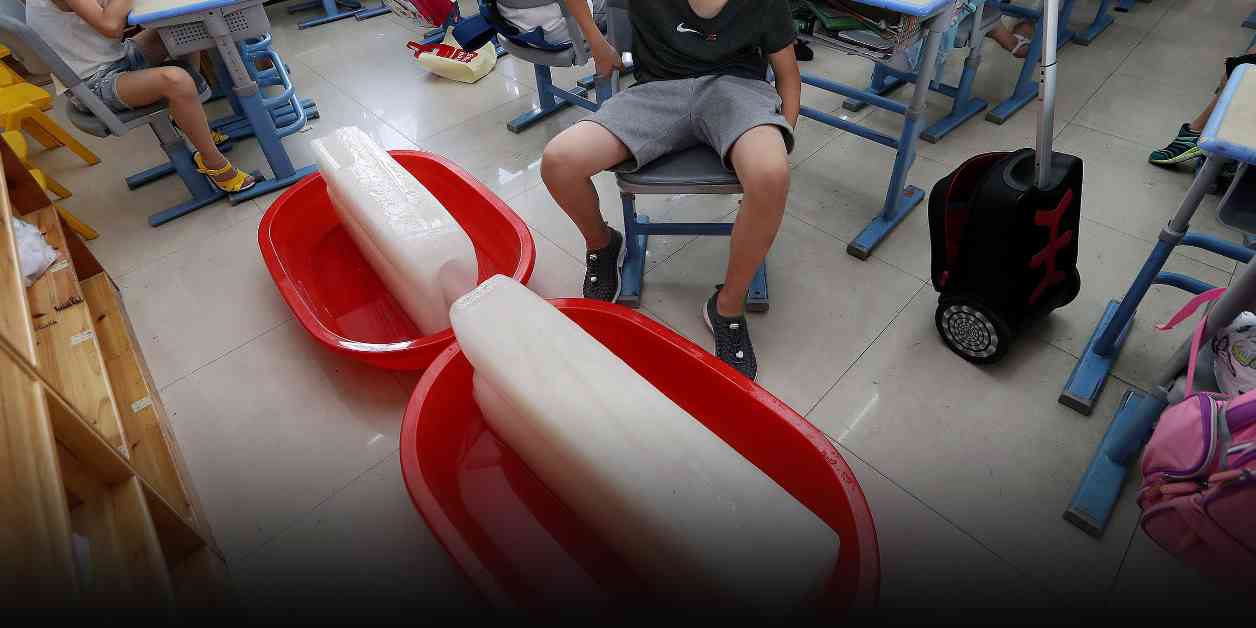China Grapples with Extreme Heat as School Year Begins
China is currently experiencing an unseasonal heat wave that is disrupting the start of the academic year, leaving schools struggling to keep students cool and comfortable as temperatures soar above 35 degrees Celsius in many parts of the country. With many primary and middle school classrooms lacking air conditioning units and relying solely on ceiling fans for ventilation, the heat inside these overcrowded classrooms can become unbearable for students and teachers alike.
In response to the extreme weather conditions, there have been intensifying public calls for schools to install air conditioning units in their classrooms. Some schools have resorted to emergency measures such as delaying classes or asking parents to donate air conditioning units and giant blocks of ice to help alleviate the heat. However, these calls for donations have also sparked controversy, with accusations of schools trying to pass on the cost of air conditioning installation to parents.
Controversy Erupts Over School’s Handling of Air Conditioning Donations
One primary school in central China’s Hunan province came under fire for allegedly asking parents to pay for the installation of air conditioning units in each classroom. The school issued a donation form to parents, requesting them to agree on which families would foot the bill for the new AC units, sockets, and wiring in each classroom. The document even specified the brand of air conditioning that parents should purchase, raising concerns about transparency and fairness.
While local officials maintained that the donations were voluntary, the incident quickly gained traction on Chinese social media platforms, leading to public backlash. In response to the criticism, local education authorities intervened and ordered the school to reimburse the parents for any expenses incurred. This incident highlighted the growing pressure on schools to provide adequate cooling solutions for their students amid rising temperatures.
Changing Attitudes Towards Air Conditioning in Chinese Classrooms
In the past, many schools in China did not consider air conditioning in classrooms a necessity, as students were typically on vacation during the hottest and coldest months of the year. However, the increasing frequency and intensity of extreme weather events have prompted a shift in attitudes towards air conditioning in educational settings. This year, prolonged heat waves caught schools across the country off guard, leading to disruptions in the academic calendar.
Regions such as Chongqing, Sichuan province, and Jiangxi province have postponed the start of the fall semester due to the scorching temperatures, underscoring the urgent need for cooling solutions in schools. While air conditioning is not yet a mandatory requirement nationwide, some regions have taken proactive measures to equip public primary and junior high schools with AC units. Cities like Wanning, Yangzhou, and Changzhou have made air conditioning a standard feature in all public schools to ensure a comfortable learning environment for students.
In 2022, Shanghai issued guidelines mandating the installation of air conditioning in all classrooms of the city’s primary and junior high schools, reflecting the growing recognition of the importance of indoor climate control for student well-being. Despite these efforts, some local authorities remain hesitant to allocate funds for air conditioning installation, citing budget constraints and concerns about potential health risks associated with prolonged AC use.
Parental Concerns Over Lack of Air Conditioning in Schools
Parents have voiced their concerns about the lack of air conditioning in schools, emphasizing the impact of high temperatures on their children’s learning experience. Lin Yujun, a father of a junior high school student in Guangdong province, highlighted the challenges faced by students in overcrowded classrooms without adequate cooling systems. He emphasized the importance of air conditioning in creating a conducive environment for studying and urged authorities to prioritize the health and well-being of students.
As temperatures continue to rise in Guangdong and other regions, parents like Lin worry about the potential health risks posed by prolonged exposure to extreme heat in school settings. With children struggling to concentrate and stay focused in sweltering classrooms, the need for air conditioning as a basic amenity in educational facilities has become increasingly apparent. Despite the concerns raised by education bureaus, parents advocate for the installation of air conditioning to ensure a safe and comfortable learning environment for students.
Overall, the debate surrounding air conditioning in Chinese schools reflects the broader challenges posed by climate change and extreme weather events. As temperatures soar and heat waves become more frequent, the need for effective cooling solutions in educational settings becomes imperative. Schools, parents, and authorities must work together to address these challenges and prioritize the well-being of students in the face of rising temperatures.

















